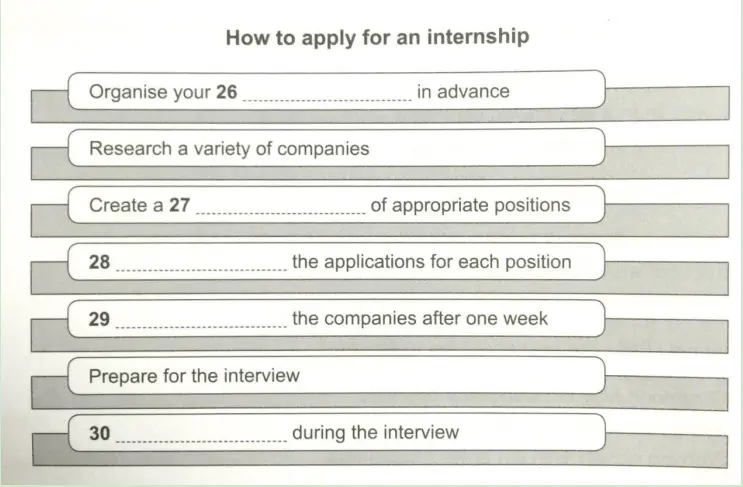BC Asia Guide to IELTS Listening Test 3 - Luyện Nghe IELTS
Từ khoá: IELTS Listening BC Asia Guide Luyện thi IELTS Đề thi IELTS Listening IELTS Listening Practice Test
Bộ sưu tập: BC Asia Guide to IELTS - Hướng dẫn luyện thi IELTS toàn diện
Số câu hỏi: 1 câuSố mã đề: 1 đềThời gian: 1 giờ
208,741 lượt xem 16,044 lượt làm bài
Complete the form below.
Write NO MORE THAN TWO WORDS AND/OR A NUMBER for each answer.
New Password
Example: Call taken by: Natasha
Customer's full name: Michael
Date of birth: 27 March 1988
Previous address: 319 , East Providence
Phone number:0492 48002
Data allowance:
Current payment plan:
Mother's maiden name:
First pet:
New password sent on:
Extra services requested:
- New
- Cancel
- pack
Where can each of the following items be found?
Choose SIX answers from the box and write the correct letter, A-I, next to questions 11-16.
Locations
- A on washing machine
- B in hallway cupboard
- C in hot water cupboard
- D next to back door
- E in bathroom
- F on top of television
- G in bedroom
- H under kitchen sink
- I above front door
Complete the notes below. Write NO MORE THAN TWO WORDS AND/OR A NUMBER for each answer.
Difficult parking in town at the weekend because of so many
Museum is closed on
Recommended places to eat:
- for Chinese food
- Pizzeria for Italian food
Phone number for takeaway pizza -
Choose the correct letter, A, B or C.
Complete the flow-chart below. Write NO MORE THAN TWO WORDS for each answer.

Complete the notes below. Write ONE WORD ONLY for each answer.
DEVELOPMENT STUDIES
Development Studies attempts to understand:
- How societies change and progress over time
- What (31) ......................... help to make these changes
Two approaches:
- Theoretical (understand how change occurs)
- Applied (examine (32) ......................... and how they can be applied) Areas of focus: Asia-Pacific region; urbanisation (including employment and (33 ).........................); migration; trade.
You will develop the skills to:
- Understand key development issues in detail
- Gather data (both (34) ........................ and textual data)
- Carefully (35) ......................... findings
- (36) ......................... on a research project
Brief history of Development Studies:
1950s – The discipline emerges. (37) ......................... issues are the major consideration.
1970s – Development studies became more (38) ......................... of the
establishment. Questions were raised about power, environmental
sustainability and (39) ......................... issues.
1980s-today – National governments were no longer as important. Growing
interest in small-scale practices such as remittances and (40) ......................... .
1 mã đề 1 câu hỏi
1 mã đề 1 câu hỏi
1 mã đề 1 câu hỏi
1 mã đề 1 câu hỏi
1 mã đề 1 câu hỏi

